Страны Латинской Америки: проблемы национальной безопасности и внешнеполитической независимости. Рубрика в журнале - Вестник ВолГУ. Серия: История. Регионоведение. Международные отношения
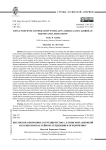
China’s defense cooperation with Latin America and Caribbean: trends and limitations
Статья научная
Introduction. China started to develop military-to-military ties and defense-industrial cooperation with Latin America and Caribbean countries in the early 2000s as an element of its strategy of comprehensive cooperation with the region. Defense cooperation was mentioned in the Chinese documents and statements on the policy in the region from the early 2000s. However, China has always considered this defense cooperation to be just a secondary, subordinate element of its overall strategy in the region.
Бесплатно
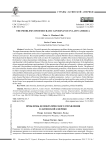
The problems of democratic governance in Latin America
Статья научная
Introduction. The article presents the contemporary problems facing governance in Latin America. The paper demonstrates that the fissures that weaken institutional and democratic stability in the region respond to a set of aspects subordinate to the crisis of expectations regarding the permanent promise of economic development. Methods and materials. The research problem was based on Leonardo Morlino’s theory of democratic unanchoring. We indicate that the objective of the work is to show five explanatory variables of the erosion of democracy, based on the historian’s classic documentary methodology. Analysis. Fundamentally, it shows 1) the high level of disaffection and discomfort with the political classes; 2) the risk of a new wave of populism and authoritarianism; 3) the implications of poor economic performance post-pandemic; 4) the repercussions of high rates of insecurity, violence, and organized crime; and 5) the problems in achieving regional integration and relevant global participation.
Бесплатно
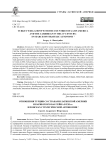
Статья научная
Introduction. Turkey’s search for a new regional and global role in a changing world order has increased Ankara’s attention to the Global South, which was peripheral to its foreign policy priorities during the Cold War. Although Ankara’s growing engagement and influence in the Latin America and Caribbean (LAC) region has attracted increasing attention from the research community, Turkey’s foreign policy in this region is still poorly understood. This article attempts to explore Turkey’s policy in LAC during the first decades of the 21st century, placing it in the context of Turkey’s increasing desire for “strategic autonomy.” Methods. The author used a case study approach to analyze Turkey’s policy in LAC. Results . After the Justice and Development Party came to power in Turkey in 2002, Turkey began a systematic effort to develop relations with LAC, expanding political, economic, and cultural ties with countries in the region. Since the July 2016 coup attempt in Turkey, Turkey’s foreign policy has been increasingly guided by the desire for “strategic autonomy.” Growing mistrust and conflicts in Turkey’s relations with the U.S. and the EU have increased Ankara’s interest in seeking alternative partnerships and building situational alliances. Although Ankara’s growing ties with LAC countries (especially Brazil, Mexico, and Argentina) increase the autonomy of its foreign policy, Turkey remains critically dependent on the West, both economically and in terms of security.
Бесплатно
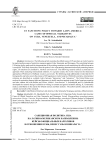
Статья научная
Introduction. The following article examines the effectiveness of US sanctions on Latin America by analyzing three cases of restrictive measures against Cuba, Venezuela, and Nicaragua. The correlation between US foreign policy goals and the interpretation of the existing sanctions results containing the official narrative is analyzed. This study shows that, from the point of view of promoting democratization and protecting human rights, US sanctions are ineffective. Methods and materials. The following research utilizes a constructivist approach when analyzing international relations. To a greater extent, this work is based on the theoretical approaches of Professor G. Hufbauer. Analysis and results. The following study additionally reveals that the US foreign policy narrative covers the erosion of US hegemony in Latin America. Within this narrative, international relations are described as a global rivalry between “democracy” and “autocracy.” The United States uses motives for protecting human rights and democracy to justify sanctions against several Latin American countries and also weaken ties with Russia and China. Author’s contributions. L. Sokolshchik and Yu. Sokolshchik developed the research design in addition to writing its content and general scientific editing. K. Teremetskiy made a contribution to the search for official sources and their analysis. The authors jointly analyzed all the content and results of the research.
Бесплатно
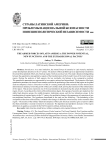
Вооруженные силы Латинской Америки: силовой потенциал, новые функции и фактор внерегиональных связей
Статья научная
Введение. Вооруженные силы стран Латинской Америки как государственный институт сохраняют уверенную динамику развития в XXI веке. Анализ данной проблематики позволяет определить силовой потенциал латиноамериканского региона. Методы и материалы. Исследование основано на различении количественных и качественных аспектов трансформации вооруженных сил латиноамериканского региона. Сквозным методом при анализе обоих аспектов выступает сравнительный метод, позволивший выявить страновые отличия в особенностях функционирования армий и их причины. Количественные параметры представлены в двух ракурсах: национальном и международном. Проведено сопоставление динамики базового количественного параметра - численности вооруженных сил, а также позиционирование армий региона в глобальном масштабе. Статистическую базу исследования составили данные мирового рейтинга вооруженных сил Power Index. Анализ. Практически во всех странах Латинской Америки с начала XXI в. наблюдается тенденция к наращиванию активного военного персонала, что свидетельствует о нарастании милитаризации региона. Данный процесс представляет собой одну из макротенденций, которыми характеризуется актуальное развитие латиноамериканского региона.
Бесплатно
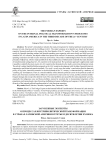
Статья научная
Введение статьи включает основные предпосылки для процесса внутриполитической трансформации в странах Латинской Америки и Карибского бассейна (ЛАК). Цель излагаемого исследования заключается в выявлении новых тенденций во внутренней политике наиболее крупных стран региона в третьем десятилетии XXI века. В качестве материалов используются исследования в основном испаноязычных авторов и испаноязычных информационных агентств, которые наиболее близко и полно владеют ситуацией в странах ЛАК, объективные данные докладов различных структур ООН и приглашенных в латиноамериканские университеты независимых англоязычных исследователей. Методологической основой данной статьи стал научный принцип объективности, который позволил из имеющегося массива информации выделить основные направления трансформации, происходящие в странах ЛАК в исследуемом периоде. Применение системного подхода позволило выделить главные события в странах ЛАК, которые характеризуют разновекторные внутриполитические тенденции. С помощью специального историко-сравнительного и историко-генетического методов автором были выявлены причины и дальнейшие перспективы развития латиноамериканских стран. Результатами исследования стали выводы автора о том, что внутренняя политика крупных латиноамериканских стран в третьем десятилетии XXI в. характеризуется тенденцией «догоняющего» развития. В политической системе этих стран отмечается неустойчивость внутриполитического курса (от либерального к консервативному курсу и обратно), а частая смена экономических моделей не дает желаемого результата. Социальные проблемы, обусловленные нищетой основного населения и особенно коренного, не могут разрешиться из-за транснациональной миграции населения и транснациональной преступности (от наркотрафика до торговли людьми и оружием). Все это объясняет разновекторность внутриполитической трансформации в латиноамериканских странах.
Бесплатно
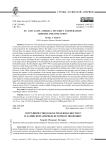
Сотрудничество в области безопасности ЕС и Латинской Америки: история и эволюция
Статья научная
Введение. Данная статья анализирует процесс сотрудничества в области безопасности между Европейским союзом и странами Латинской Америки c позиции исторического институционализма и методологического инструментария, предложенного Копенгагенской школой. Автор освещает основные этапы развития отношений между этими двумя регионами, начиная с ранних инициатив в сфере политической и экономической поддержки и переходя к более глубокому сотрудничеству в области безопасности.
Бесплатно

